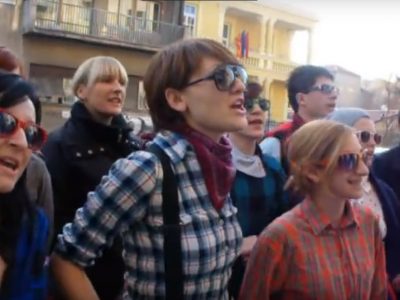Stories about Eastern & Central Europe from November, 2009
Video: Worldwide youth express themselves in 60 seconds
The OneMinutesJr project gives young people between 12 and 20 years of age from many corners of the globe the opportunity to express themselves across borders, languages and distances through 60 second videos.
Russia: Thousands Protest Against Trading Center Construction
On November 29, thousands of people in Moscow went out on the streets to protest against the construction of a new trading center. This center would replace the “Cherkizovski” market...
Russia: How Passengers of “Nevsky Express” Tell Their Stories Through Social Media
The crash of the "Nevsky Express" train happened far from any major populated area. It took several hours for reporters to arrive on the spot. Only then the first photographs and videos started to appear everywhere. But what happened to citizen reporting that led the way in the coverage of the plane crash in Russia a year ago?
Russian authorities stop application process for domains in new .РФ zone zone
The Russian Coordination Center for the new national Cyrillic domain .RF stopped the application process for new domains. Anti-cybersquatting measures turned out to be infective and the center plans to...
Hungary: Violence “Behind Doors”
This month, Hungarian NGOs joined the 16 Days of Activism Against Gender Violence Campaign. Marietta Le describes the situation with domestic violence in Hungary and translates one blogger's post on the subject.
Russia: At Least 25 People Killed in the ‘Neva Express’ Train Crash
An express train traveling from Moscow to St. Petersburg derailed at 9:34 PM on Friday, Nov. 27, near the town of Bologoye, killing at least 25 people. Below are some of the initial reactions from the Russian blogosphere.
Russia: Official Government Web sites Will Be Regulated By Law
A new law “On Ensuring Access to Information about Activities of Government Bodies and Municipal Authorities” [RUS] will require, among other things, creating public Internet terminals all around Russia. But...
Russia: Social Networks Help Find Debtors
Court enforcement officers in Russia actively use social networks to gather information on debtors and their properties, Russian news agency Prime-TASS reports [RUS].
Russia: Tatarstan Blogger Sentenced to Almost 2 Years in Penal Colony
On Sept. 12, 2008, Tatar blogger and journalist Irek Murtazin blogged about rumors of Tatarstan president Mintimir Shaimiev's death. On Nov. 26, 2009, Murtazin was convicted of defamation and incitement to hatred and sentenced to 1 year and 9 months of penal colony.
Russia: Free Wi-Fi To Be Installed At Moscow Railway Stations
The Russian Railroads company announced [RUS] today that free wi-fi hotspots would be installed at every passenger terminal in Moscow by December 7, 2009. The company expects around 1,500 wi-fi...
Russia: Website Administrator Faces Trial on Libelling
Alexander Batalov, a former administrator of the official Web site for the town of Irbit, faces libel charges for anonymous comments left by someone else on the site. Batalov is...
Russia: Defense Ministry Reports “Non-Combat Losses” Online
Russia's Defense Ministry reports on its website that suicides, accidents, murders, and, possibly, manslaughter claimed 297 lives in the country's armed forces from Jan. to Oct. 2009, and that 149 of these deaths were suicides. Andrei Skvarsky reports on some of the Russian netizens' reactions to these figures.
Russia Begins Registering Domains in Cyrillic
November 2009 will take a special place in the history of the Russian Internet. It is the month when a Cyrillic domain zone was born - .РФ (Russian Federation). Russia became the first country that allows top-level domains in non-Latin characters. Up until now, governments, companies and individuals could register domain names based on different languages only in Latin transliteration. The current Internet domains system will go much further allowing to use Cyrillic characters in a URL.
Slovakia: Mobile Internet Providers Put an End to Internet Neutrality
This month, a second Slovak mobile internet provider has kept its promise and started filtering internet access for its customers. While officially the goal is to block child porn, things aren't as simple as they appear. Tibor Blazko reviews the reactions of concerned Slovak netizens.
Russia: Mansion of The President Has A Lot To Offer
The Russian president's mansion became a topic of discussions on the Internet when people found a bidding offers invitation for services at the government Web site [RUS] dealing with different...
Macedonia: Singing Skopjans
An ad hoc choir "Singing Skopjans" performs civic activism through songs, using social media to spread their message.
Russia: Anti-fascists Mourn Murder of Activist Killed By Neo-Nazis
Hundreds of young anti-fascists gathered in the center of Moscow. They mourned the murder of Ivan Khutorskoy, an activist of “Antifa,” Russian anti-fascist movement. A blogger chtodelat claims [ENG] it's...
Russia: Social Network Graffiti Gains Popularity
English Russia writes about the phenomenon of “social network graffiti” [ENG] that became very popular among the users of the leading Russian social network Vkontakte.ru.
Poland: Catholics Propose Adding Cross to National Emblem
Sylwia Presley reviews the reactions of Polish bloggers to a recent proposal by a Polish Catholic group to include the symbol of the cross in the national coat of arms.
Poland: Online Campaigning for the Rights of Employees
Sylwia Presley writes about the plight of and online campaigning by a group Polish citizens who work for IKEA via another, smaller, company called Solid Security: they claim to be earning amounts below the national minimal wage, being assigned to work up to 16 hours daily and lacking the basic benefits.
Russia: Local Authorities Slow Broadband Development
On November 10, activists held a rally calling for broadband Internet and protesting against Internet provider monopoly in the township of Kraskovo (Moscow region, 10 km from the Moscow beltroad). This is the first known case of a protest dedicated to the defense of the Internet rights in Russia. The event also raised the issue of the overregulatedness of the process of Internet providing in the country.




